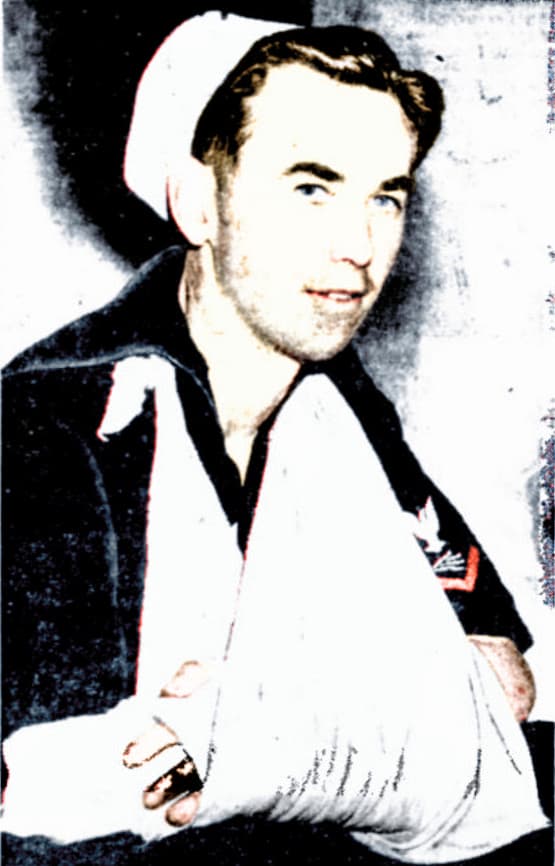Unalaska caught asleep by Japs despite warning, mayor relates
Practice alerts had made them indifferent to dangers
By John W. Fletcher, written for the United Press
This eyewitness account of the bombing of Dutch Harbor was written by the Mayor of Unalaska, a town near Dutch Harbor on Unalaska Island. He is 36 and he has been intimately acquainted with the Aleutian Islands for 14 years.
Dutch Harbor casualty

Vowing vengeance on the Japs, Burt Browne, 20-year-old U.S. Navy aviation machinist third class, came back to Seattle from the fight at Dutch Harbor, Alaskan outpost, with his arm in a sling. The very bullet which smashed his hand killed his buddy right beside him as they attempted to take off in a Navy flying boat.
Seattle –
Days before the attack, I had been informed of the approach of a portion of the Jap fleet. This information was given in order that I could check up on the preparations necessary for Civilian Defense in Unalaska. The night of June 2, I had information that a Jap carrier was within 400 miles of Unalaska Island.
Three days before the attack, it was agreed that all liquor establishments would close. This was done at the request of military authorities.
It may sound odd that we should have been caught asleep in bed at the time the attack came. We learned the hard way, because we had known many alerts before – that is, practice alerts. We became indifferent to the danger ahead.
Saw seven bombers
In one sense, we depended on getting a “flash” message from the amateur Alaska aircraft warning system. However, our particular frequency was extremely noisy that night. We were standing watch in relays, 24 hours a day, in my “radio shack.” We awoke at 5:45 a.m. the morning of June 3 to the sound of unusually heavy anti-aircraft fire. Looking out toward the Bering Sea near the top of a mountain, I saw at least three Jap Zero fighters. From this quick glance, the impression was that they had run into heavy anti-aircraft fire unexpectedly.
I called Mrs. Fletcher to hurry and dress and we immediately proceeded on our prearranged plan of heading for our basement. Upon arriving there, we saw disappearing toward the northwest four large bombers. A moment later, from the southwest, approaching Dutch Harbor, came three more. This made at least seven bombers. Their particular objective – Dutch Harbor – is long and narrow. They approached and let go of two bombs each, which were later described as 2,000-pound bombs. Two warehouses were struck and one barracks.
Surprised at planes’ size
There were some casualties, most of which could have been avoided if the men had remembered to lie flat on the ground. In the confusion of running for shelter, they forgot the lessons taught them.
Fires immediately broke out where the bombs struck. All this time, a heavy barrage of anti-aircraft fire was going on. The sky was filled with bursting shells and puffs of smoke. Tracers shooting up toward the bombers were falling just short of their mark. However, the heavier shells were bursting above, below and all around the bombers. At this point, may I say that I was very much surprised at the enormous size of the planes the Japs were using in their attack.
The results definitely proved there is nothing wrong with Japanese eyesight. At the point they struck, the land was narrow. At the height they flew, their marksmanship had to be good to hit anything.
Soldier aid ‘swell’
About this time, a military patrol informed me that all women and children should proceed to the main highway in the middle of town, where they would be picked up by trucks and taken to a valley for better protection. My car was at hand, and getting our neighbor who was ill, her children and another woman, we hastened up the valley selected. On our way, we saw coming down this valley, flying about 300 feet above the road, what we took to be an American-built P-40. Just before it reached us, it veered to our left. It was another Jap plane, possibly of the Zero type.
Taking the women to a sheltered spot in a ravine, I returned and made several trips. In a short time, two more cars arrived and we quickly emptied the town of women, children and sick, from the government hospital in Unalaska.
The soldiers were positively swell in their assistance to all civilians. They were cheerful, and helped a great deal in holding up the morale of the people. They did everything to make the sick, women and children comfortable. They also brought hot coffee and other things.
No civilians hit
The attack lasted about 35 minutes. We had another alert at noon, but no planes were sighted from Unalaska. They were probably intercepted at some distance from Dutch Harbor.
The fighter plane that passed us proceeded toward town and strafed it from east to west. Many shells were dropped from the plane.
The bombing on Dutch Harbor was rather heavy. No civilians were hit in Unalaska.
The Japs showed either great courage in coming so close, or they have absolutely no regard for their lives whatsoever.
Most of the white population was evacuated immediately afterward, but most natives have remained. My present concern is to have the rest taken inland to some safer spot.
